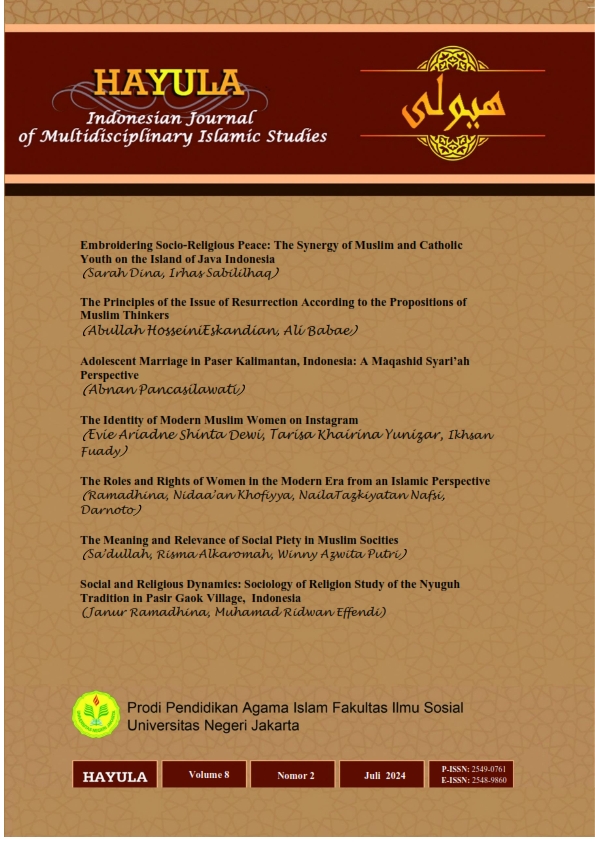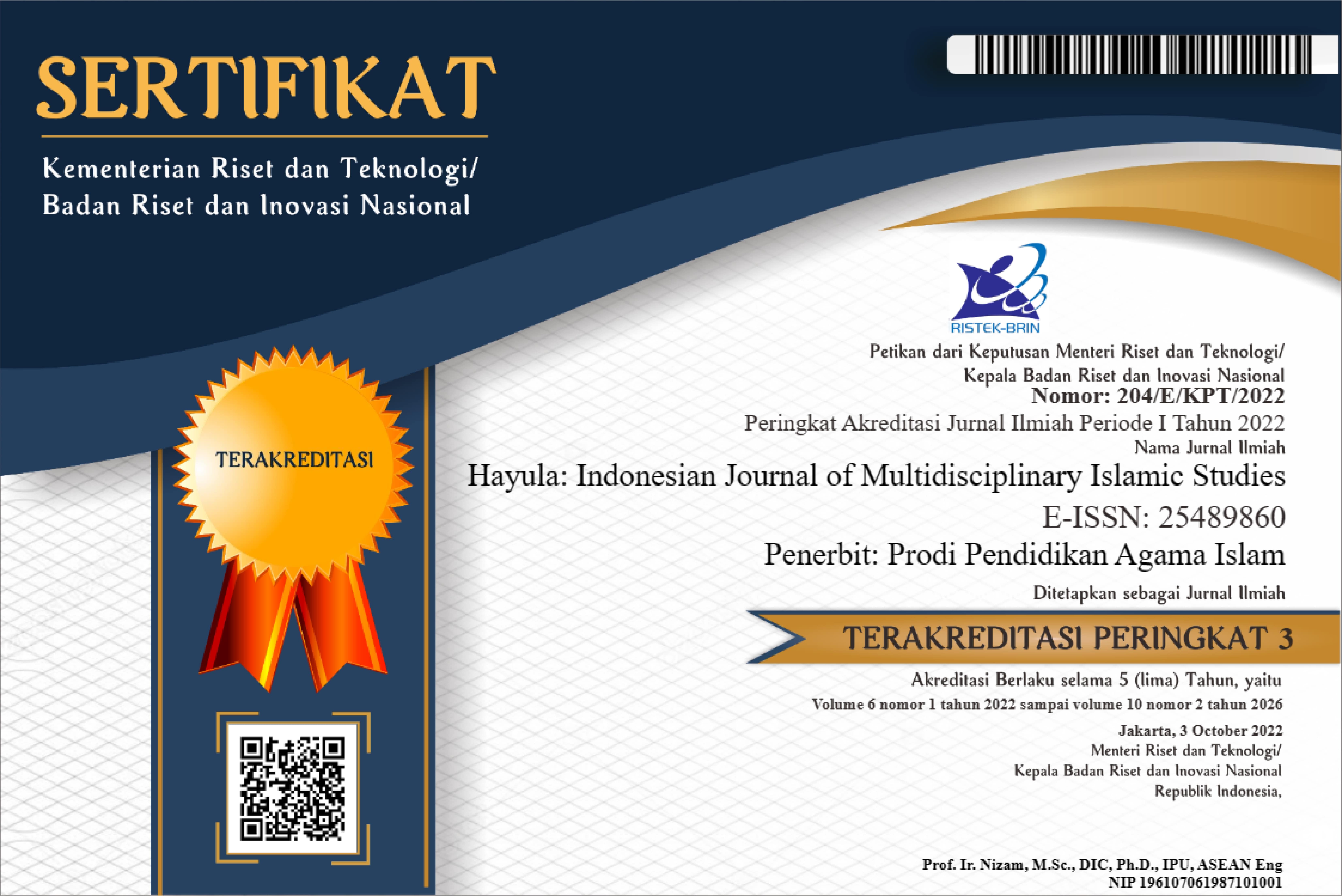The Meaning and Relevance of Social Piety in Muslim Societies
DOI:
https://doi.org/10.21009/hayula.008.02.06Keywords:
Piety Verses, EduEcational Implementation, Thematic MethodsAbstract
It can be observed that the advancement of comprehension within specific communities often serves to illuminate the presence and significance of religious belief systems. This is evidenced by the presence of formal storefronts and religious rituals. Conversely, there is less appreciation for the application of universal religious teachings in the social context of community life. This prompted researchers to embark on a study. This research draws upon the texts of piety in the Qur'an, which are mentioned in various forms. In the form of nouns (isim), lafadz al-shālihāt, lafadz al-shālihūn/al-shālihīn, and lafadz shālihan. In addition, the verb form (fi'l) is derived from the root words shaluha and aslaha. This study employs a qualitative analysis approach, with content analysis used to examine the texts. These are descriptive and verbalistic in nature, drawn from the Qur'an and Hadith. To elaborate on the data, the author employs a variety of approaches, including philosophical, semantic, and sociological. The research findings present an exploration of the meaning of the matan, or content, of the verses of social piety, demonstrating the cohesion of the concept of piety as an expression of social awareness.
References
Alaih, M. (1949). Dalam Lu'lu wa Al-Marjan (hal. 28).
Al-Hamid, A. B. (t.thn.). Tsulasi Akidah Salaf Saleh, Amud Fustot Al-Islam.
Al-Qardhawi, Y. (1997 ). Dalam Assunah Masdar Lil Ma'rifah wa Al-Hadaroh (hal. 125).
Cairo: Dar Al Syuruq Cet 1.
Al-Zuhayli, W. (1993). Al-Qur'an Al-Karim Bunyatu At-Tasyri. 'Asyur, M. A. (t.thn.). Usul Annidzohm Al-Ijtimai fi l-Islam Jilid 2.
Al-Maragi, Tafsir al-Maragi, alih bahasa Bahrun Abubakar dkk, (Semarang: PT Karya Toha Putra, 1992)
A. Malik Fadjar, Holistika Pemikiran Pendidikan (Jakarta: PT. Raja Grafindo Persada, 2015),. v.: Prenada Media.
Arief Sukino, Ilmu Pendidikan Islam, Pontianak:STAIN Press 2013) Ajaj Al-Khatib, As-Sunnah Qabla At-Tadwin, (Darul Fikr, Beirut, 2021) Athar (Damaskus: Maṭba’ah al-Ṣabah, 1421 H)
Djumransyah, Filsafat Penidikan (Malang: Bayumedia Publishing 2004)
Faruq, M. Y. Al. (2019). Konsep Kesalehan dalam al- Qur’an: Kajian atas Tafsir Muhammad Asad tentang Ayat-ayat Al-Birr dalam The Message of the Qur’an.
Fuad, Ihsan. 2018. Dasar-dasar Kependidikan. Jakarta:. Rineka Cipta Suwarno, Wiji. 2009.
Dasar-dasar Ilmu Pendidikan. Jogjakarta: Ar-Ruzz Media
Hadi, S. N. (2015, Juni 26). Amal Saleh. Diambil kembali dari Kompasiana: https://www.kompasiana.com/sugengnugrohohadi/54fd7a72a33311fe1650ffe5/amal- saleh
Ibnu Hajar al-‘Asqalānī, Nuzhat al-Naẓar fī Tauḍīh Nukhbat al-Fikr fī Muṣṭalaḥ Ahl al- Pidarta, Made. 2007. Landasan Kependidikan, Stimulus Ilmu Pendidikan Bercorak Indonesia. Jakarta: Rineka Cipta
Muhammad al Wiy al Maliki, al Qawa’id al Ulum al Hadis, cet.IV (Jeddah : al Maktabah al Ilmiyah, 1402)
M. Abdurrahman & Elan Sumarna. Metode Kritik Hadis (Bandung: Remaja Rosdakarya, 2011)
Ngalim M. Purwanto. 2007. Ilmu Pendidikan Teori dan Praktek, Bandung: Remaja Rosda Karya
Nūruddin ‘Itr, Manhaj al-Naqd fī ‘Ulūm al-Ḥadīth (Beirut: Dār al-Fikr, 2020 Qutb, S. (2003). Tafsir Fi Dzilaili Qur'an.
Ramli Abdul Wahid, Studi Ilmu Hadis, Cet. III (Bandung; Citapustaka Media Perintis, 2011)
Sukina, 2018. Konsep Sabar Dalam Al-Quran Dan Kontekstualisasinya Dalam Tujuan.
The Encyclopedia of Religion. (1995). Dalam M. Eliade. New York: Simon dan Schuster
T. M. Hasbi Ash-Shiddieqy, Sejarah dan Pengantar Ilmu Hadits, cet. VI (Jakarta: Bulan Bintang, 1999),
Zakiah Daradjat, Kesehatan Jiwa dalam Islam (Jakarta: PT. Pertja, 1998)
Downloads
Published
How to Cite
Issue
Section
License
Authors who publish with this Journal agree to the following terms:
- Author retain copyright and grant the journal right of first publication with the work simultaneously licensed under a creative commons attribution licensethat allow others to share the work within an acknowledgement of the work’s authorship and initial publication of this journal.
- Authors are able to enter into separate, additional contractual arrangementfor the non-exclusive distribution of the journal’s published version of the work (e.g. acknowledgement of its initial publication in this journal).
- Authors are permitted and encouraged to post their work online(e.g. in institutional repositories or on their websites) prior to and during the submission process, as it can lead to productive exchanges, as well as earlier and greater citation of published works.
Users/public use of this website will be licensed to CC BY







